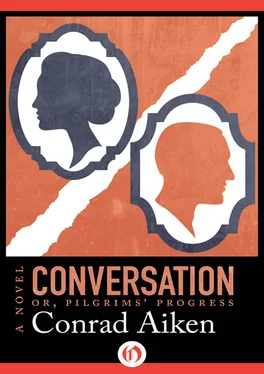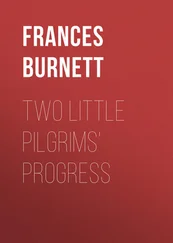Oh, well, maybe it was all for the best. It would certainly simplify things, makes things easier with Enid?… The slow pang hollowed itself out in his breast again — dear delightful humorous Nora! — but he quenched it, looked away from it, looked down through the Puringtons’ garden at the river and the dismasted hulks which lay on their sides on the farther shore — rotting, like so many other things in this sleepy little town — and then, with quicker steps, and a clear sense of relief — or no, not quite that, not quite, but at any rate a sharper sense of detachment and singleness with which to face Enid — he entered his own garden. He walked past the house, toward the back. Terence’s blue wagon stood there, looking very large in the twilight, the horse pawing at the grass, and Enid and Terence were talking at the kitchen door.
“It’s the lilacs,” Enid said. Her arms were folded across her breast, across the pink smock, and she addressed the remark rather to the wagon than to himself.
“Guess you got plenty of ’em, too, Mr. Kane, judging by the looks of those boxes!” Terence took out his clay pipe, grinned, spat.
“A hundred, Terence — ninety-seven plain, and three fancy! What are we going to do with them?”
Enid turned and opened the kitchen door.
“And when you’ve finished—” she looked down toward the river—“there’s some one in the sitting room, the studio, waiting to see you.”
The door clacked shut behind her — why the devil couldn’t she say who it was!
“Well, Mr. Kane, guess we’d better get ’em in tonight. ’Twon’t do ’em no good to lay around here in the frost!”
“You think there’s going to be a frost?”
“A good one. I’ll come over after supper and bring a shovel.”
“Okay, Terence. Let me know and I’ll give you a hand.”
“They sure packed ’em up good. Quite a weight, too. I thought I’d bust a gut!”
The three boxes lay like great coffins on the grass, the torn grass, the sand showing where the box corners had gouged through the thin topsoil, and Terence kicked one of them affectionately with the toe of a heavy boot.
“And where did you have it in mind to put them?”
Together they looked along the sloping garden, now growing dark, the bare little garden which led down to the river. The river gleamed almost unnaturally in the queer light — bat-light, he thought, betwixt-light, the hour of the mosquito — but later, of course, there would be the full moon.
“Wants two nights for the full moon,” Terence added. “Guess we can make out to see , all right!”
“All along both sides, Terence — right from the street on that side and from the back of the kitchen on this. And then a few across the middle there, halfway down, leaving just a sort of gateway through to the lower terrace. Where you built the wall.”
“Never will I forget those fleas!”
“Yes, that was funny.”
“It was all them rats. Yes, sir, it was from them rats they come; foh, I never saw such filth in all my life, no, sir! Why, there was millions of them, that soil and muck and seaweed was full of them, and I begun scratching, and old Bill he begun scratching, we didn’t know what it was. But we found out, all right! Gorry! When I got home, I stood up on the middle of a blanket, without nary a stitch on, and a bucket of water beside me, and hoo didn’t the little buggers hop! It was all right for me, but poor old Bill, he was half blind, he couldn’t see much, and they sure did make him miserable! He was in a torment.”
“I remember those rats; they lived in the cellar-hole, and down in the corner where the pigsty used to be.…”
Terence chuckled, they both chuckled, then Terence took the reins of the horse, and began backing and turning the wagon.
“I’ll be in later, then,” he said.
“All right. Give me a shout. Sure you don’t mind, Terence?”
“Glad to do it. No good putting dead lilacs into the ground, is there?”
“No!”
The reflector lamp had been lit in the kitchen, on the shelf behind the coal stove, and in the dining room the candle flames rose pale and tall on the table, where Enid sat witchlike, her elbows on the polished walnut, her cheeks on her fists. The yellow light narrowed and brightened the green gleam of her eyes, but he couldn’t be sure whether they quite looked at him. She was waiting, visibly waiting, and at once it was as if some obscure current had stiffened and frozen between them.
“Who is it?” he said.
“George.”
“Why couldn’t you have said so!”
“Was there any necessity? He’s got something of considerable interest, you’ll find, to say about your friend Jim Connor.”
“Oh, he has!”
“Yes. And might I remind you that dinner is ready? I think he could have chosen a better time to call. He knows perfectly well what time we have dinner.”
“Very well, you needn’t wait for me.”
“Thank you, I’ll wait!”
“I don’t think you’d better.”
“What do you mean by that?”
“Oh, nothing. But it might take some time!”
He made this remark as if humorously, over his shoulder, looking back from the doorway. She still sat unmoving, but now the green eyes were subtly lifted and turned towards him, with an expression, however, which he hadn’t time to fathom. Good lord, he thought quickly, how lovely she is, it isn’t fair! Not fair to man or beast. Nobody has a right to be as beautiful as that, or if they have, they shouldn’t be allowed to sit in candle light.
The studio was half dark, and George stood tall and white as a ghost by the fireplace, his striped palmbeach suit immaculate as always, the Panama hat in his hand. He was on his dignity, a little formidable and formal, the man of property come to uphold his rights.
“Hello, didn’t Enid give you a light?”
“Ah, I’m afraid I’ve come at an inconvenient moment, Tip, but I thought as you’d be going up to town tomorrow I mightn’t catch you—”
“Not till the day after. Mondays, Tuesdays, and Fridays!”
The bright blue eyes twinkled mischievously behind the black-corded glasses, the magisterial headmasterly head, with its close gray curls, inclined just perceptibly forward in the ghost of a bow. He slapped his hat, as if irritatedly, against his knee, turning slowly towards the struck match, the lighted candle on the mantel, the piled pine logs and pine cones in the wide fireplace.
“Forgive me, old fellow — how stupid of me. Of course.”
“Sit down. What’s on your mind?”
“Didn’t Enid tell you?”
“Well, she murmured something about Jim Connor—”
George motioned with his hat towards the picture on the easel, as he sat down.
“Looks kind of familiar,” he said. “Charming, my boy! Weir Village, isn’t it?”
“Large as life.”
“And twice as natural!”
He crossed his long legs, first carefully pulling up the exquisitely creased white trousers.
“Well, what about Jim Connor?”
“That’s what I want to know. What we all want to know.”
“Who is ‘all’?”
“I won’t mention any names, if you don’t mind, but I’ve talked it over with several people—”
“The town fathers, I suppose?”
“No, not yet. Of course not, Tip. I wanted first to see you.”
“Very kind of you.”
“Not at all. And you needn’t be sarcastic!”
“All right, go ahead.”
“Perhaps you could tell me something about him. I think we have a right to know a little more — unless, of course, you want to be responsible for him, which personally I wouldn’t recommend! There is such a thing as being an accessory before the fact, you know — you’d be conniving!”
Читать дальше












